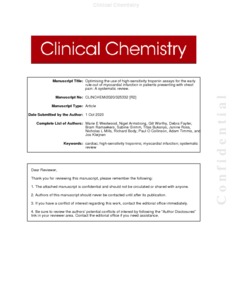Westwood, ME;
Armstrong, N;
Worthy, G;
Fayter, D;
Ramaekers, BLT;
Grimm, S;
Buksnys, T;
Ross, J;
Mills, NL;
Body, R;
et al.
Westwood, ME; Armstrong, N; Worthy, G; Fayter, D; Ramaekers, BLT; Grimm, S; Buksnys, T; Ross, J; Mills, NL; Body, R; Collinson, PO; Timmis, A; Kleijnen, J
(2021)
Optimizing the Use of High-Sensitivity Troponin Assays for the Early Rule-out of Myocardial Infarction in Patients Presenting with Chest Pain: A Systematic Review.
Clin Chem, 67 (1).
pp. 237-244.
ISSN 1530-8561
https://doi.org/10.1093/clinchem/hvaa280
SGUL Authors: Collinson, Paul
![[img]](https://openaccess.sgul.ac.uk/112904/1.hassmallThumbnailVersion/CLINCHEM-2020-325332v3-Westwood.pdf)  Preview |
|
PDF
Accepted Version
Available under License ["licenses_description_publisher" not defined].
Download (636kB)
| Preview
|
Abstract
BACKGROUND: We assessed the accuracy and clinical effectiveness of high-sensitivity cardiac troponin (hs-cTn) assays for early rule-out of non-ST-segment elevation myocardial infarction (NSTEMI) in adults presenting with acute chest pain. METHODS: Sixteen databases were searched to September 2019. Review methods followed published guidelines. The bivariate model was used to estimate summary sensitivity and specificity with 95% confidence intervals for meta-analyses involving 4 or more studies, otherwise random-effects logistic regression was used. RESULTS: Thirty-seven studies (124 publications) were included in the review. The hs-cTn test strategies evaluated in the included studies were defined by the combination of 4 factors (assay, number of tests, timing of tests, and threshold concentration or change in concentration between tests). Clinical opinion indicated a minimum acceptable sensitivity of 97%. A single test at presentation using a threshold at or near the assay limit of detection could reliably rule-out NSTEMI for a range of hs-cTn assays. Serial testing strategies, which include an immediate rule-out step, increased the proportion ruled out without loss of sensitivity. Finally, serial testing strategies without an immediate rule-out step had excellent sensitivity and specificity, but at the expense of the option for immediate patient discharge. CONCLUSION: Test strategies that comprise an initial rule-out step, based on low hs-cTn concentrations at presentation and a minimum symptom duration, and a second step for those not ruled-out that incorporates a small absolute change in hs-cTn at 1, 2, or 3 hours, produce the highest rule-out rates with a very low risk of missed NSTEMI. PROSPERO REGISTRATION: CRD42019154716.
| Item Type: |
Article
|
| Additional Information: |
This is a pre-copyedited, author-produced version of an article accepted for publication in Clinical Chemistry following peer review. The version of record Marie E Westwood, Nigel Armstrong, Gill Worthy, Debra Fayter, Bram L T Ramaekers, Sabine Grimm, Titas Buksnys, Janine Ross, Nicholas L Mills, Richard Body, Paul O Collinson, Adam Timmis, Jos Kleijnen, Optimizing the Use of High-Sensitivity Troponin Assays for the Early Rule-out of Myocardial Infarction in Patients Presenting with Chest Pain: A Systematic Review, Clinical Chemistry, Volume 67, Issue 1, January 2021, Pages 237–244 is available online at: https://doi.org/10.1093/clinchem/hvaa280 |
| Keywords: |
General Clinical Medicine, 1004 Medical Biotechnology, 1101 Medical Biochemistry and Metabolomics, 1103 Clinical Sciences |
| SGUL Research Institute / Research Centre: |
Academic Structure > Molecular and Clinical Sciences Research Institute (MCS) |
| Journal or Publication Title: |
Clin Chem |
| ISSN: |
1530-8561 |
| Language: |
eng |
| Publisher License: |
Publisher's own licence |
| Projects: |
|
| PubMed ID: |
33418577 |
| Web of Science ID: |
WOS:000606798900016 |
| Dates: |
| Date |
Event |
| 2021-01-08 |
Published |
| 2020-11-22 |
Published Online |
| 2020-10-21 |
Accepted |
|
 |
Go to PubMed abstract |
| URI: |
https://openaccess.sgul.ac.uk/id/eprint/112904 |
| Publisher's version: |
https://doi.org/10.1093/clinchem/hvaa280 |
Statistics
Item downloaded times since 04 Feb 2021.
Actions (login required)
 |
Edit Item |



